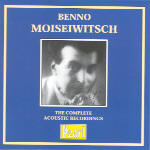Among recent Benno Moiseiwitsch reissues, the present release from Pearl is the most unusual yet systematic of the crop. It contains all of his acoustic recordings, dating from 1916 to 1925 when the emerging pianist was in his 20s and 30s. These discs are contemporaneous with early phonographic efforts by Hofmann, Rachmaninov, Busoni, Cortot, Grainger, Backhaus, and other keyboard eminences, and clearly reveal that Moiseiwitsch held his own among older, more established colleagues. Where do you begin to describe the numerous musical and pianistic felicities here? Try, for starters, the perfectly-spaced rubatos and revelatory inner lines throughout the pianist’s supple Brahms B minor Capriccio (Op. 76 No. 2). Or listen to the easy ebb and flow of his passagework, blissfully liberated from the tyranny of the barline, in the Chopin/Liszt My Joys, the Chopin F-sharp Impromptu, and Schumann/Liszt Frühlingsnacht (the latter is more songful and relaxed than Josef Lhevinne’s famous electrical traversal). And what stupefyingly quick, feathery, and crystalline unison runs he achieves in Selim Palmgren’s Bird Song and The Sea. Rarely has Scriabin’s Nocturne for the left hand emerged with such freshly delineated textures: it sounds as if two hands on two separate pianos are involved!
Moiseiwitsch was not one to play by the book, and astute listeners will notice and hopefully delight in the pianist’s textual emendations at times, such as those in the Chopin E minor Nocturne Op. 72 No. 1, or that sparkling coda he adds to Henselt’s knuckle-busting etude Si oiseau j’étais. There are a few selections Moiseiwitsch re-recorded more effectively in the electric era, like Debussy’s Jardins sous la pluie and Ravel’s Jeux d’eau. Conversely, the pianist’s acoustic Chopin C minor prelude is relatively straight and unadorned next to the one in his complete 1948 traversal of the Op. 28 Preludes. An interesting textual sidebar: the 1948 C-minor Prelude incorporates the “traditional” E-natural on the final beat of measure three, while the acoustic version sports the “controversial” E-flat favored by latter-day Urtext practitioners like Claudio Arrau.
Producer Donald Manildi adds a generous bonus in the form of some of the pianist’s rarest early electrical sides. These include a Wagner/Liszt Liebestod (minus its opening measures) spun out in lyrical, independent lines and a Scarlatti-Tausig Pastorale and Capriccio with ravishing legato that melts in your mouth. Here also is the first and still best recording of Abram Chasins’ once-popular Rush Hour in Hong Kong–so feathery, fleet, and nonchalant. Seth Winner’s transfers are generally clear and clean. Comparing the present transfer of the acoustic Mendelssohn G minor concerto to Winner’s earlier Pearl transfer (Benno Moiseiwitsch Volume 1, GEMM 9135), I found the earlier refurbishing noisier yet with more room tone and pedaling details. The differences, to be sure, are ultimately inconsequential given the built-in sonic limitations of acoustic orchestral recordings; but they are there. All in all, a set that no Moiseiwitsch lover and historic piano recording enthusiast should ignore. [8/21/2001]
































